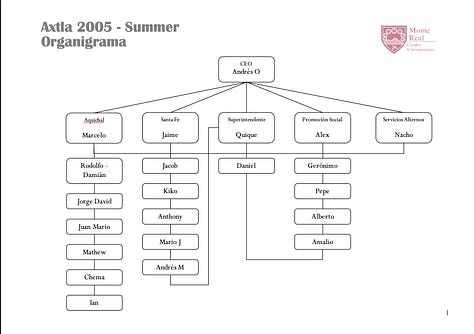You should always be connecting
Or most of the times
👋 Hey, it’s Andrés. Welcome to Astrolab’s weekly newsletter on how to become a better communicator at work. We write for knowledge workers and business owners.
Today: Why and how to be better at connecting with others
Read time: 10 minutes without the videos
Here are my three ideas for today:
Prestige and connection are a way to influence
How to connect Pt. 1: Dunkin’ Donuts
How to connect Pt. 2: Phil Dunphy
Last week I said that I was going to start going deep into each of the five things great communicators do while preparing for a meeting, presentation or conversation:
thinking about the organization strategy,
deciding on an objective for the interaction,
choosing the ideas,
planning on how to communicate the ideas, and finally,
working on the specific words they’ll use.
Yeah, well, I’ll start with that next week. Before, I want to get another post out of my system. Here’s the main idea:
Your ability to connect with others is the basis for influence
Think about why you do exercise. You workout either because A. you want to be healthy and in shape, or because B. you have a specific event, race, beach trip or game coming up
Most of the advice around interpersonal communication focuses on the event (presentation), the race (meeting), the beach trip (business conference), or the game (conversation), and ignores the rest of the interactions, like
having small talk with a colleague at the kitchen,
the first minutes of a meeting,
an unexpected call with a sales prospect, future boss or business partner
Here’s the plot twist: most of the time we spend communicating with others falls in the latter… and somehow frames the former.
Prestige and connection are the way to influence
If you ask me what do I do for a living, I’ll probably say two things. I’ll answer that I
Help professionals become more influential by learning how to use storytelling tools, and that I
Talk to people (old and new)
The first version is the task-oriented part of my job: helping people acquire storytelling for influence skills.
The second one enables this, and it has become a way of living my life. For the past twenty years, I’ve spent a disproportionate amount of time starting and strengthening connections.
I do it because I have a high level of curiosity about people, because I’m in love with mankind—well, with most of it anyways—, and because I’ve found that meeting new people is a great way of expanding your experience.
Then, ten years ago, I read Adam Grant’s Give and Take, and got obsessed with this quote:
There are two fundamental paths to influence: dominance and prestige. When we establish dominance, we gain influence because others see us as strong, powerful and authoritative. When we earn prestige, we become influential because others respect and admire us.
I’ve never been high in dominance. Growing up, I was never physically strong, didn’t had a strong voice, or a lot of money. So that leaves me with prestige.
I grew up in Monterrey, Mexico, in a middle-class family. I spent most of my high school and college years trying to get friends—and friends of friends—to live up to their Catholic faith.
Most of my free time during those years was committed to social work: visiting terminally-ill patients during Friday afternoons, helping kids prepare for their First Communion every Saturday morning, traveling to a mining community in the Durango mountains, and building latrines for families in the Huasteca Potosina during spring break and summer.



To achieve this, I had to convince friends to join me. My only argument was:
Hey, this is good for you, and it’s your duty as a Catholic.
Leaving faith aside, how did I manage to convince people? I think that my message resonated with their own narrative: they were also trying to be better.
But also, I became better with time because I slowly learned how to connect with others. Specifically, I learned that everyone wants to be seen and heard, and that people liked the idea of being better. Slowly, I earned prestige in my community.
Twenty years later, I don’t think my argument has fundamentally changed.
That’s how I engage with others. I try to be present, and to create a space of presence and consciousness rooted in a belief: that all of this is unique, special and temporary, and that every interaction is a possibility to give, instead of an opportunity to take.
Do you want to increase your prestige? Learn how to connect with others.
Here are two ways to do this that complement each other.
How to connect, Pt. 1: Dunkin’ Donuts
In 2006, Dunkin’ Donuts introduced a new campaign: America runs on Dunkin’. The campaign tried to push the following idea:
We’re more than a donut company.


Dunkin’ Donuts is big in Philly, so I stumble upon their advertising and stores frequently. Recently, this thought has been popping up in my head:
America runs on Trust
Substitute America for your city, your organization, your community, your friends’ group, your family, if you want.
When people don’t trust each other, bad things happen. And things work better when people they trust each other:
You’ll close deals with people that trusts you
You’ll get that promotion only if your manager trusts you
You’ll get a second and third date, if you make her/him trust you
You’ll get others to believe in your brand, if you build enough trust
You’ll get more traction in your community if others respect and admire you
Do you want to earn prestige and connect with others? Find how to increase the level of trust others put in you.
How do you do that?
Here’s an idea: be more like Phil Dunphy.
How to connect, Pt. 2: Phil Dunphy
What.
(Ok, this will make much more sense for those who have watched Modern Family.)
But Phil Dunphy is really one of those fictional characters that are really likable for MOST of people.
And why’s liking important in a conversation around trust, prestige and connection? Turns out, trust operates through liking.
In the most cited scientific article on the subject –by far–, Nicholson et al. (2001) designed a survey that was completed by 238 heavy equipment store owners.
The results? That likability largely determines the trust we feel for the other person. In other words: trust operates through sympathy.
So if we want to build trust, work on how you come across. And that’s where Phil Dunphy is relevant.
–ChatGPT, why is Phil Dunphy an icon of likability?
People love Phil Dunphy because he’s genuinely optimistic, self-deprecating, and relatable. His loyalty to his family, childlike spirit, and deep love for Claire make him endearing and fun. Phil’s blend of humor and heart creates a character who’s both hilarious and lovable.



I’m not talking about being a different person than yourself. My suggestion is this: be more present and try to really care about people.
You’ll find your own way of being Phil Dunphy.
Bonus. Always Be Connecting
The movie Glengarry Glen Ross (1992) did bad on the box office, but since then has become a cult classic, especially this 7-minute scene featuring Alec Baldwin:
The scene was then parodied by the same Baldwin:
Instead of always be closing (or cobbling!), make sure you’re always connecting, which means trying to have a special moment of true communication and empathy with others.
But have a good intention. People are not dumb, and will sense if you’re doing it just because you want to advance a specific career or business outcome.
Build connections because you are human—and everyone you’ll meet is too—. Humans crave for connection. Can you ignite it?
Thanks for being here! I’ll see you next Thursday.
Andrés



